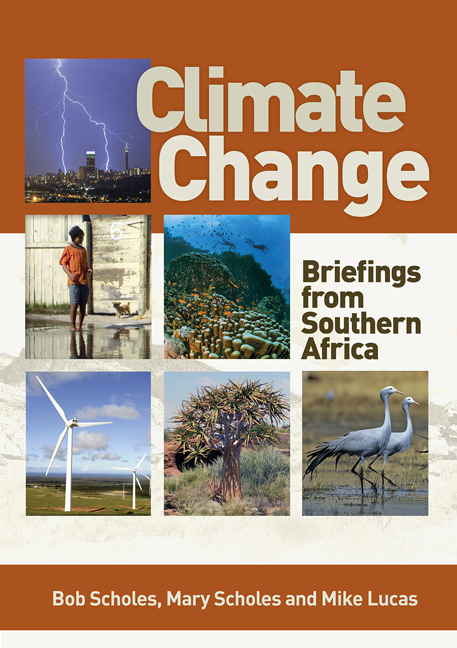Book contents
- Frontmatter
- Acknowledgements
- Contents
- Foreword
- Acronyms and abbreviations
- Preface
- How do governments assess climate change?
- Section 1 Earth system science: The processes that underlie climate change
- Section 2 Consequences of a changing climate for the Southern African environment
- Section 3 Consequences of a changing climate for society
- Section 4 What we can do to avoid and adapt to climate change
- Introduction
- 1 Is it cheaper to tolerate climate change or prevent it?
- 2 Is carbon trading desirable or useful?
- 3 Is it possible to take carbon dioxide out of the atmosphere?
- 4 Could fertilizing the oceans fix climate change?
- 5 Could we reduce incoming solar radiation?
- 6 Are there viable alternatives to coal for South Africa?
- 7 Can nuclear power provide the clean energy we need?
- 8 Can we turn garbage into energy?
- 9 Do biofuels offer a solution?
- 10 Could spekboom save our bacon?
- 11 Can we help plants and animals adapt to climate change?
- 12 Can we build climate-friendly houses and cities? 170
- 13 How can I reduce my carbon footprint? 173
- Codicil Is there a dangerous level of climate change?
- Glossary
- List of figures
- References
- Reading list
- Index
9 - Do biofuels offer a solution?
from Section 4 - What we can do to avoid and adapt to climate change
Published online by Cambridge University Press: 20 April 2018
- Frontmatter
- Acknowledgements
- Contents
- Foreword
- Acronyms and abbreviations
- Preface
- How do governments assess climate change?
- Section 1 Earth system science: The processes that underlie climate change
- Section 2 Consequences of a changing climate for the Southern African environment
- Section 3 Consequences of a changing climate for society
- Section 4 What we can do to avoid and adapt to climate change
- Introduction
- 1 Is it cheaper to tolerate climate change or prevent it?
- 2 Is carbon trading desirable or useful?
- 3 Is it possible to take carbon dioxide out of the atmosphere?
- 4 Could fertilizing the oceans fix climate change?
- 5 Could we reduce incoming solar radiation?
- 6 Are there viable alternatives to coal for South Africa?
- 7 Can nuclear power provide the clean energy we need?
- 8 Can we turn garbage into energy?
- 9 Do biofuels offer a solution?
- 10 Could spekboom save our bacon?
- 11 Can we help plants and animals adapt to climate change?
- 12 Can we build climate-friendly houses and cities? 170
- 13 How can I reduce my carbon footprint? 173
- Codicil Is there a dangerous level of climate change?
- Glossary
- List of figures
- References
- Reading list
- Index
Summary
Currently biofuels hardly make a difference in the big picture, but they may fill an essential niche in future, for instance as aviation fuels. Care will need to be taken to avoid competition for land and water between biofuels and food production.
Coal, oil and gas started out as plant biomass millions of years ago. Plant biomass is currently the biggest energy source in Africa. Even in coal- and electricity-rich South Africa, many families still burn wood and charcoal. Provided the biomass is sustainably harvested, burning biomass is approximately carbon neutral – in other words, the amount of carbon dioxide (CO2) generated by the fire is the same as the amount originally removed from the atmosphere when the plant grew. Approximately the same amount of CO2 will be removed from the atmosphere when replacement plants grow.
Modern biomass energy technologies are much more thermally efficient than traditional wood-burning fireplaces, stoves or charcoal kilns. Wood, grass and forestry or agricultural waste can be burned in carefully controlled furnaces, producing energy at a cost quite similar to coal, but without most of the pollution. The problem is that biomass energy is generally spread out all over the landscape, rather than concentrated in a mine, like fossil fuels. The costs of moving it to the power plant can be high. Therefore, efficient use of biomass energy requires a shift from a few enormous power stations to many small power stations.
One of the most intractable future renewable energy challenges is to provide liquid fuels for ships, trains, vehicles and aeroplanes. Some of these modes of transport can use electricity directly from the grid or stored in batteries. Yet despite great advances in battery technology, their ‘energy density’ (that is, the energy stored per unit mass of the battery) remains too large to be a viable power source for aircraft. Liquid hydrocarbon fuels have a much higher energy density than current batteries. Biomass can be converted to liquid fuel, which can substitute for petrol, diesel and aviation fuel. Biofuels can also be blended with liquid fossil fuels, reducing the overall total carbon footprint. There are several paths to make liquid fuels from biomass:
• Oil can be extracted from many species and converted to a diesel fuel suitable for trucks, trains and jets.
• Sugars and starches can be fermented to form ethanol, which can be burned in many internal combustion engines. […]
- Type
- Chapter
- Information
- Climate ChangeBriefings from Southern Africa, pp. 162 - 164Publisher: Wits University PressPrint publication year: 2015



